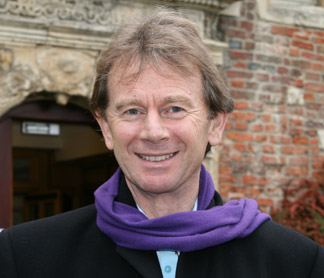Interview with... Michael Wood
Our fascination with tracing our roots is as strong as ever, says the historian.
 Ask what is the UK’s most popular leisure participation activity,
and most people would suggest gardening or watching and playing football.
Ask what is the UK’s most popular leisure participation activity,
and most people would suggest gardening or watching and playing football.
But writer and broadcaster Michael Wood’s response to the same question is rather different. He says that the biggest single leisure participation activity in Britain is history.
Community involvement in the past, he insists, has increased dramatically over the last 15 years. He points to the 70 million museum visits a year and the burgeoning membership of the National Trust, English Heritage, history and archaeology groups and local societies, in support of his case. The attraction, he believes, is that engaging with the past is enlightening, entertaining and fun.
Wood was speaking during a visit to the University where he was the keynote speaker at the conference ‘Archaeology and the Material Past in the Public Realm’, organised by York’s Institute for the Public Understanding of the Past (IPUP), with sponsorship from the Department of Archaeology and the York Archaeological Trust.
A filmmaker himself for three decades, Wood believes the size of the core audience for history programmes on television has grown, and he says that it is very important that IPUP is conducting research into how the public engage with the past.
“There are just lots more programmes now - and they all get big audiences. There’s a huge interest and the most important single thing that’s happening now is that people are realising that they can be involved, that they can actively participate in archaeology and history and heritage.”
This is reflected by the fact that the majority of visitors to public records offices up and down the country are amateur genealogists researching their family history, their own local village or area. Community archaeology groups are also thriving. Wood says that surveys by English Heritage indicate that people want to know about their intimate roots, seen through the history of their families and the places in which they live, and they want to understand where and how those origins connect with our national narrative.
Wood believes our perception of those connections to the past is never static, both in personal and family terms. “Those narratives are always changing. They change for you as a person and for you as a family. You always re-think them as you grow older,” he says.
Wood has first-hand knowledge of this popular hunger for a sense of the past, thanks to his recent BBC Two series The Story of England which used the community history of the village of Kibworth in Leicestershire to provide a unique perspective of the history of the nation.
people are realising that they can actively participate in archaeology and history and heritage
But this was not the bucolic Ambridge-like community with thatched cottages perhaps envisaged by the BBC commissioning editors. It was more utilitarian than chocolate box. But what Kibworth did have was a wealth of documents tracing its evolution from the 13th century to the present. It also had contemporary residents eager to engage with the idea of projecting the history of England through the prism of their community.
The BBC saw the reaction, both from the Kibworth locals in making the programme and from viewers across the rest of the UK. It was overwhelmingly positive.
“The BBC then said, ‘Could you do more of the same, but could you do it all over the country, and can you do it by Spring 2012 – only bigger?’” Wood says. The resulting eight-hour series will be broadcast at peak time on the BBC just before our screens are taken over by coverage of the Queen’s Diamond Jubilee, Olympic Games and the European Championships.
Using the Kibworth paradigm of community involvement, Wood’s next series will focus on the ‘compellingly interesting stories of ordinary people’ across the UK. It will explore them against the background of the milestones of our history, such as the Reformation, the Civil War and the Industrial Revolution.
Wood says, “The narrative of how rights, which we now take for granted, were won by ordinary people gives us a perspective on the past, value to our present and a sense of our identity. IPUP’s research on public engagement and the meaning of the past in the present is illuminating precisely because of these very connections. There is a huge public appetite for understanding how identity is shaped by the past in contemporary Britain, and I am very pleased to be here contributing to this conference, and to IPUP’s work.”
Further information
- Institute for the Public Understanding of the Past
- This interview featured in the January/February issue of the University Magazine
